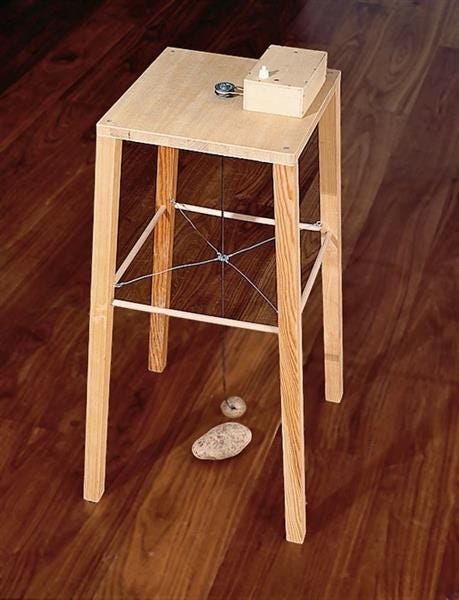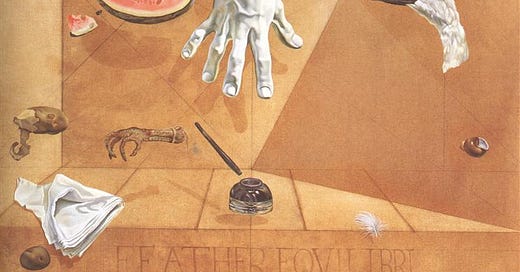Hello, my friends,
Life is progressing ever so swiftly, day by day, week by week. No one needs this reminder, am I right? It’s nice to have moments in time to look forward to. Halloween is coming up — a fun time in our neighborhood. Ashley and Michael have been going on “Halloween Walks” to check out the decorations many folks already have up. I have the intention to sign up for my second 5K on Thanksgiving Day. I won’t be dressing up like a turkey, but they do have a costume contest as part of the festivities, so I imagine some participants will. I don’t have a specific time goal in mind at the moment, but I think if I can get back into the 28-minute realm, that would be fine. I’ve begun running fairly regularly again and it’s slow-going but my times are returning to what they were before the previous 5K in July. That’s 40-years-old for you, skip out on running for a month and the body reverts back to a sack of potatoes.
On another topic, we’re a few months away from issue #100 of HMF and it has me thinking about what the next 100 weeks should be like. One of the options I’ve considered is doing an occasional audio issue. Is that something you would welcome?

Risk & Rewards
There are many ways to think about making decisions. Most people default to something like relying on one’s intuition with a few facts thrown in. When there is perfect information (meaning, all the necessary information is known and available) some people put together a spreadsheet — as I did when buying a car or laptop — because having every relevant piece of information in an adjustable grid makes sorting and filtering for the most desirable features for the lowest price (in cases where purchases are being considered) easy. Alternatively, a way to look at the world, for decision-making and beyond, is as layers of tensions between risks and rewards. I may be wrong, but I suspect that everything in existence can be reduced to an interplay of risks and rewards. Living and non-living things can be interpreted on this basis.
Right away, the inclusion of non-living things seems odd since they aren’t conscious. Moreover, they are neither making decisions nor do they have a will to exist. How do we see a risks and rewards from the perspective of a rock? We don’t. The lens of risk and rewards is a way for us (or each individual) to conceptually place atop everything in the world. So a more exact way to say the sentence above would be “How do we see risks and rewards from our perspective of the perspective of a rock?” Probably this isn’t so useful to think about since some rock on the moon is of no relation to us. But utility isn’t pertinent to the point. Nothing in the universe exists on its own. Everything is touching (even black holes, creatively put, are inverting into anti-matter) so everything relates. A moon rock faces the risk of being destroyed in numerous ways, some instant and some that unfold over millennia. A moon rock’s reward in its option-less existence is existence. It’s absurd to assign moral value (ie good or bad) to either risk or reward in this example, though I’m sure it would be possible for lunar scientists to calculate some vague notion of various risk scenarios for a moon rock, depending on its location/size/composition.
But I’m getting too abstract and philosophical for our casual chat. Let’s instead focus on an average decision in our daily life? What kind of pen to use? For most people, enumerating the risks and rewards of such a trivial decision seems ludicrous because the risks and rewards are so low; modern pens rarely run the risk of leaking (though it has happened to me so I don’t carry a pen in my pants pocket any more. The risk of ruining my pants is too great.), they usually work for a very long time, and they’re comfortable enough for basic use. An artist who works in pen and ink, on the other hand, might think more seriously about the risk and rewards of which pen to use. Likewise, a decision such as what to have for lunch carries many potential risks and rewards. Some of them are extremely improbable — a risk of going out for lunch is getting into an auto accident — while others are clear and obvious, a reward of either staying home for lunch or bringing lunch to work is saving money.
Here is something useful to highlight about using risks and rewards as an analytical tool or meta-perspective on existence. How we see risks and rewards (and how useful it is) is largely dependent how we measure them. Measurement is both related to what we measure (as in risks and rewards for the aforementioned lunch as related to money) and units of measure. If the “what” of lunch is nutritional value and the “units” are calories the risks and rewards are one way than if the “units” are protein. Likewise, if the subject (ie the person for whom the analysis is being done) is you or a high-performance athlete. Measurement is easier when the the “what” breaks down into quantifiable “units”, but it’s not a requirement. What are the risks and rewards of a short story writer submitting a piece to a literary journal? How do we assess the psychological risks/rewards? Or the reputational risks/rewards? Or slightly wider out, the quality of the story?
To be honest, I wasn’t expecting to write so much about this, but once I started down the path of unspooling what I had been thinking about, it was longer than expected. Unfortunately (or fortunately, depending on how keen you are on unsolicited theorizing), there is obviously more to say about seeing the world solely through a veneer of risk and reward. While, I’ve been fairly general here, another approach would have been to focus intensely on one tiny object or decision and squeeze every possible risk and reward and reward out of it. An impossible task, of course, and highly unappealing to read over coffee.
Maybe I’ll return to the topic — if only to compare and contrast risk/reward with pro/con.
Time Machine
Here’s what I wrote in HMF a year ago (in issue #35):
What Matters: Musing on the concept of significance.
Frequency of Public Intercourse: The mismatch between algorithmic success on most social media platforms and my natural inclination to share.
Weird Ingredient Cookbooks: If a recipe has five or more unfamiliar ingredients, I’m moving on!





Unfinished indeed.
Thank you for your feedback.